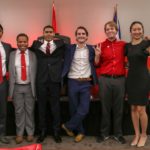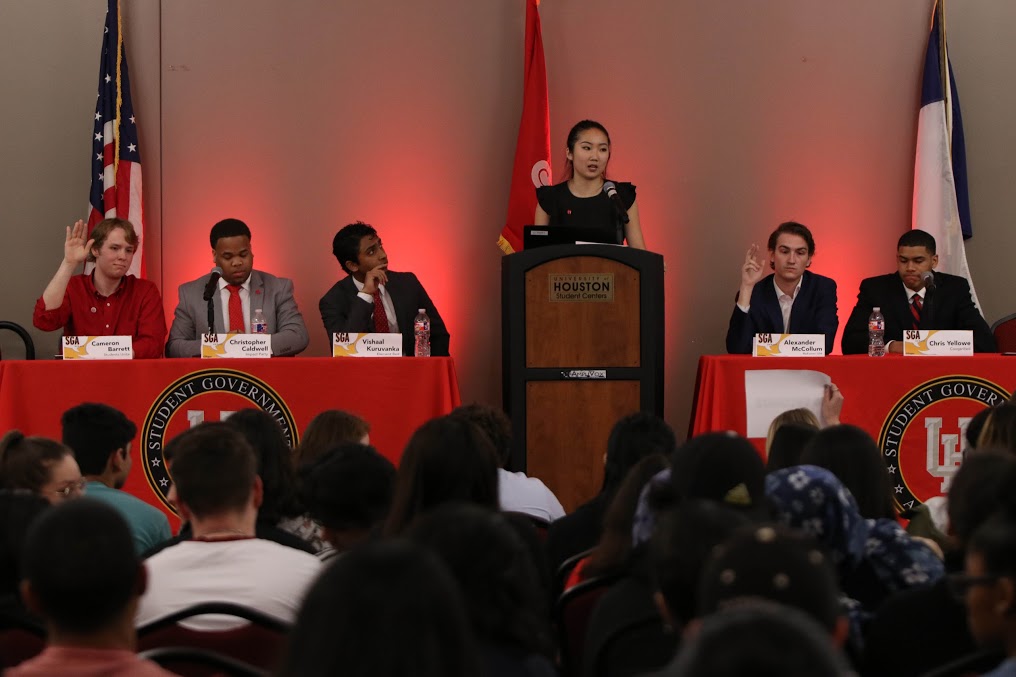

SGA presidential candidates in midst of the debate with incumbent Winni Zhang at the podium. | Thomas Dwyer/The Cougar
Presidential candidates for the 54th Administration of the Student Government Administration squared off on issues including parking, non-traditional student representation and campus safety during the SGA Presidential Debate on Feb. 22 in the Student Center South Ballroom.
The debate was structured into three rounds and moderated by The Cougar’s Editor in Chief, Emily Burleson, and Assistant News Editor, Michael Slaten, who has covered SGA for the past semester. The rounds featured candidate-specific questions, followed by random questions drawn from a bowl and then audience questions on Twitter.
Incumbent Winni Zhang was debating for the Spirit RED party, Cameron Barrett for Students Unite, Christopher Caldwell for the Impact Party, Vishaal Kuruvanka for Element Red, Alexander McCollum with Reform UH and Chris Yellowe with Coognited.
The debate commenced with Barrett receiving the first question. He was asked about his previous involvement with SGA and how his actions in fixing SGA bylaws did not match his party’s platform on textbooks and safety.
Caldwell was asked to expand on his platforms. He highlighted essential provisions students need from the University.
“You should never go without a place to stay or a place to eat,” Caldwell said.
Kuruvanka was asked how he expected to make the campus safer, as he stated in a recent interview.
“One of the major things would be more funding for UHPD,” Kuruvanka said.
Burleson noted that it is not a power of the SGA president to reallocate University funds between departments.
One of McCollum’s controversial ideas is to eliminate the stipends of the SGA president and other executive branch members. Since — according to University policy — he cannot deny the stipend, he amended that he would “donate it to other organizations.”
In an interview with The Cougar, Yellowe spoke to his stats as a commuter student and said he didn’t feel he had his voice heard on campus. He reiterated this sentiment during the debate, and said his priority would be “actually reflecting what the student body wants.”
Recent news regarding Zhang’s administration has concentrated on the five bills, whose impact largely would have been focused within the organization, she vetoed during her tenure. Zhang responded by saying, “Internal bills are not necessary to bring about change with students.”
Round two
Round two was comprised of questions drawn for each candidate at random from a bowl on the moderation desk. Topics ranged from nontraditional students, platform break-down and the recent Parkland, Florida, shooting.
Caldwell’s question concerned the population of non-traditional students at UH. With the majority of the candidates falling below the University’s median age of 23, Caldwell admitted that he can’t always relate to and know what those students want.
“The first thing that you have to do is reach out to them,” Caldwell said.
Barrett was asked to identify inconsistencies of the other candidates’ platforms.
“I think one of the big problems in the SGA is that people take credit for things that they can’t do, and do things that they didn’t do,” Barrett said.
Round three
The last set of questions was asked from Twitter using the hashtag #SGAdebate18.
One of the questions selected by the moderators asked what candidates would do to find a place for Muslim students to pray on campus. Outside of the Bruce Religion Center, Muslim students don’t have a permanent place to pray.
They briefly had the basement of the Quads, but that is no longer an option as demolition on the Quads commenced last week.
“We need to have devoted Muslim prayer spaces in all buildings,” Kuruvanka said.
Candidates like Caldwell emphasized the necessity of having a student body president — and candidates, for that matter — who have experience and student advocacy at UH, regardless of SGA involvement.
Barrett disagreed, saying that any student should have the right to run if they so choose.
“Just because any student can do it, doesn’t mean every student should do it,” Caldwell said.
In the closing remarks, the candidates had their last chance to push for their campaigns. Zhang used her incumbency and her party history, Barrett used his self-proclaimed “breadth and width of understanding,” and Caldwell used the “working man’s college” moniker, as their backing for votes.
The SGA election will take place on Get Involved from Feb. 27 to March 1.
features@thedailcougar.com
—
“Here’s what you missed at the SGA Presidential Debate” was originally posted on The Daily Cougar
